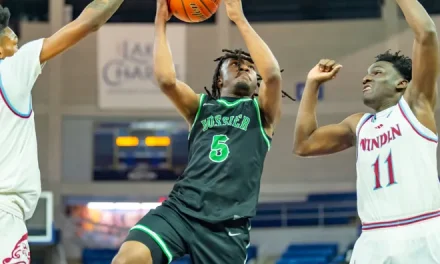By: Matt Vines, Communications Specialist at LSUS
SHREVEPORT – LSU Shreveport is offering the nation’s first bachelor’s degree in occupational physiology starting this fall.

Dr. Cory Coehoorn, a Canadian native, said this emerging field is becoming popular in Canada and other parts of the world, but LSUS is the first American university to offer this program.
Occupational Physiology is the study of occupational hazards and the effect they have on the human body.
The field is typically folded under exercise science or exercise physiology, but LSUS is offering more depth to the topic to create a degree program.
“People who work as firefighters, police officers and in the military, they experience unique types of stress that you wouldn’t normally experience in exercise or sport environments,” said Coehoorn, who is a gratis faculty member at LSUS and a full-time faculty member at the LSU Health Sciences Center. “Most of my research has hinged on that, firefighters and heat stress and how heating up so quickly impacts the brain and stress responses.”
The LSUS degree offers five concentrations – environmental physiology, exercise science, coaching, strength and conditioning and health fitness management.
Environmental physiology and coaching are new concentrations while the other three concentrations have been shifted from the public health degree in a move to streamline students to their careers of choice.
Coehoorn was instrumental in the development and construction of the LSUS Human Performance Lab, which contains the first environmental chamber for human data collection in Louisiana.
The chamber has enabled research related to human performance in variable climates, humidity percentages, altitudes and oxygen availability among other controllables.
“The environmental chamber allows for research to be done in various environments, and we can create environments that are really cold, really hot and can change the humidity and altitude. We can simulate any number of occupational environments.”
Most of the required classes already exist in the LSUS Kinesiology department, but Coehoorn has created courses in cardiovascular physiology, environmental health and ergonomics.
Coehoorn recently studied the effect of rapid body temperature rise in firefighters using the environmental chamber, which also included the impact of cooling suits and other personal protective equipment.

The field of occupational physiology isn’t confined to extreme conditions. It also includes areas like altered sleeping patterns for nightshift workers, workers with multiple jobs or workers who stare at computer screens in an office chair for extended periods of time.
“What are the effects of these conditions over long periods of time?” said Aaron Adams, who was promoted to manager of the Human Performance Lab. “If you’re working multiple jobs, chances are you’re leaving one job for another, which likely means that you don’t sleep a lot and your nutrition is probably bad.
“Things like staring at computer screens all day strains your eyes, and working in a windowless office without any natural light can affect mood.”
Graduates can pursue careers as safety officers or related positions in specialized fields as they’ll gain more specific knowledge and experience in occupations with unique environments.
“One really good example are jobs in the Air Force and Navy called Aerospace and Operational Physiologists,” Coehoorn said. “You also have industries like firefighting and police in which research on the effects of these occupations is growing tremendously.”
The coaching concentration is headed up by USA Weightlifting Hall of Famer Dr. Kyle Pierce, who developed LSUS’s USA Weightlifting Development Center and coached for Team USA, Ghana and Seychelles.
Specific coaching classes include practical applications of applying physiology and psychology to sports. Other topics include additional strength and conditioning classes, including a tactical strength and conditioning class that focuses specifically on high-impact careers such as military and first responders.
“It’s probably not what most people think about a coaching concentration – this is more coaching theory with a heavy emphasis on sport science,” Pierce said. “The concentration isn’t centered around specific sports, although students will have opportunities to work with specific sports in their practicum.
“But bringing more sport science into coaching not only makes sports safer but improves athlete performance.”
The creation of the occupational physiology degree is part of a restructuring of the department to more efficiently direct students into their career fields.
“Our goal was to create a more direct path for the student to get into their desired career,” said Dr. Jill Rush-Kolodzey, interim chair of the kinesiology and health science department. “If you want to be a coach or trainer or perhaps you want to get more into the sciences, we have a clear delineation for that.
“For me, it’s important that every student is on a path that has job at the end.”
One way the department is assisting students in identifying their passion earlier in the program is through a new introductory science class (SCI 100).
This one-hour credit is required for public health students but is open to any student who might be interested in a career in health sciences.
“We bring in speakers from all kinds of disciplines, and they speak about their daily tasks and what it takes to succeed in that field,” Rush-Kolodzey said. “We want to identify students early on who want careers in health or exercise science, and perhaps they find a mentor or a field in which they want to pursue.”
The public health bachelor’s degree has been revamped to meet accreditation requirements after a switch from the previous community health name.
This degree, which offers concentrations in pre-physical therapy, pre-occupational therapy, community and public health and non-profit leadership alliance, more closely aligns with the master’s degree in public health.
###
About LSUS
Founded in 1967, Louisiana State University Shreveport offers a wide array of nationally accredited undergraduate and graduate degree programs, including a doctoral degree. The university’s mission is to educate a diverse population of graduate and undergraduate students; engage in regional and global thought leadership through community collaboration and service; and innovate to enhance the application of knowledge and intellectual discovery through faculty and student research and creative endeavors.









